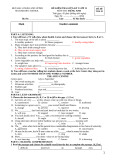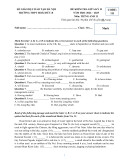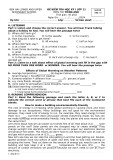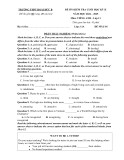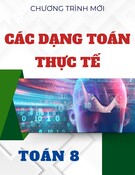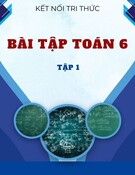
TRƯỜNG THPT NGÔ GIA TỰ ĐỀ CƯNG ÔN TẬP KIỂM TRA GIỮA KÌ 2
Tổ: TIẾNG ANH TIẾNG ANH 11 – Năm học : 2024- 2025
I. CNTNTS: Units 6, 7, 8
II. Prnuncitin: Units 6, 7, 8
III. 1. Grmmr: Units 6, 7, 8
- To- infinitive clauses
- Perfect gerunds and perfect participle clauses
- Cleft- sentences with It is/ was… that/ who…
2. Vcbulry: Words and phrases related to Units 6, 7, 8
3. Reding: Topics related to Units 6, 7, 8
4. Listening: Topics related to Units 6, 7, 8
5. Writing: Topics and grammar related to Units 6, 7, 8
IV. XRCISS
A. RADING
Part 1. Read the passage and choose the correct answer that best fits each of the numbered blanks.
GAP YAR
In the professional or career world, a gap year is a year before going to college or university and (1)
finishing high school or taking a year off before going into graduate school after completing a
bachelor as an undergraduate. During this time, students may (2) in advanced academic courses,
extra-academic courses and non-academic courses, such as yearlong pre-college math courses, language studies,
learning a trade, art studies, volunteer work, travel, internships, sports and more. Gap years are sometimes
considered a way for students to become independent and learn a great deal of (3) prior
to engaging in university life.
Australians and New Zealanders have a tradition of travelling overseas independently (4) a
young age. In New Zealand, this is known as “doing an OE” (Overseas Experience). Sometimes, an OE is limited
to one year, but often Australians and New Zealanders will remain overseas for three to five years, with many
working short-term in service industry jobs to fund (5) continuing travels. Europe and Asia
are popular destinations for doing an OE. In Australia, through exchange programmes and benefits for youth,
there are so many opportunities for a young person (6) their mind through travel in a gap year.
Questin 1: A. therefore B. before C. after D. during
Questin 2: A. engage B. engages C. engaged D. to engage
Questin 3: A. responsible B. responsibility C. irresponsible D. irresponsibility
Questin 4: A. at B. on C. in D. for
Questin 5: A. his B. our C. its D. their
Questin 6: A. broaden B. broadening C. to broaden D. broadened
Part 2. Read the following passage and choose the correct answer to each of the questions.
When it comes to preparations for studying abroad, the very first challenge for students is how to live
independently. Stepping out of their comfort zone to live and study in a faraway country often ingrains an
obscure fear of loneliness and helplessness. Therefore, if you have a plan to earn a degree in a foreign country,
you need to equip yourselves with essential skills to start a truly independent life as soon as possible. First and
foremost, you do not need to be an excellent cook but should know basic cooking skills to feed yourselves.
Suppose that you experienced a pandemic period, you would have to cook at home due to social distancing and
most restaurant closures. Second, clean-up and household skills are of equal importance. To lower
accommodation costs, many students often choose to share apartments with other mates. Definitely, no one
wants to stay with thse who are untidy and do not know how to do simple household tasks, so make sure that
you can do daily housework well enough. Third, money management is a challenging task for most overseas
students. Some students are often flat broke at the end of the month because they cannot handle their budget.
It’s advisable to be a smart shopper by making a suitable shopping list and keeping an accurate record of your
daily expenses to avoid pointless debt. In short, the pieces of advice will hopefully make your independent life
easier when you go to university in another country.
Questin 1: What is the passage mainly about?
A. How to face loneliness and helplessness at home
B. Ways to gain independence while studying abroad
C. Overseas students and problems with additional expenses
D. Young students’ adjustment to sharing an apartment





